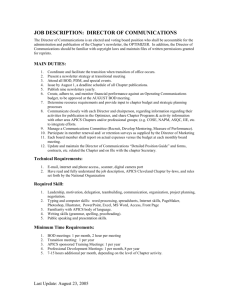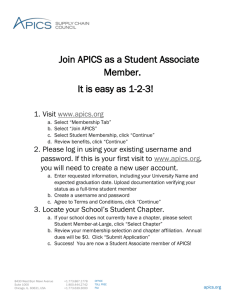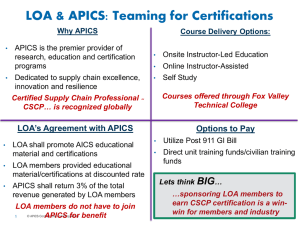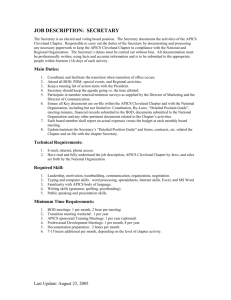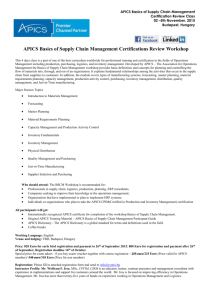Supply Management Assessment
advertisement
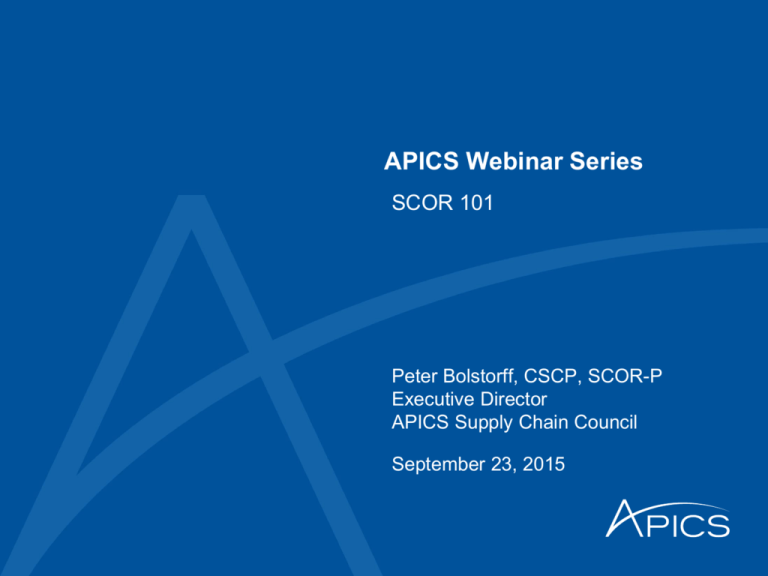
APICS Webinar Series SCOR 101 Peter Bolstorff, CSCP, SCOR-P Executive Director APICS Supply Chain Council September 23, 2015 Introduction Peter Bolstorff, CSCP, SCOR-P Executive Director | APICS Supply Chain Council Delegate from 3M and then Imation for SCOR 1.0 in 1996 Expertise in Manufacturing and Planning including Center of Excellence Leadership for Sales and Operations Planning Authored, Supply Chain Excellence: A Handbook for Dramatic Improvement Using the SCOR Model, 3rd Edition First Supply Chain Council non-staff Certified Instructor and now SCOR-P and CSCP From 2002 to 2014, Helped 30+ Companies Analyze $13.5B USD Deriving $200M USD in Operating Income Improvements Have volunteered with the SCC since the beginning Industry experience includes Chemical, Retail, Food and Grocery, Electronics, Durable Goods, Consumer Packaged Goods, and Aerospace and Defense 2 © APICS Confidential and Proprietary Seven Good Questions 1. Who is the APICS Supply Chain Council? 2. What is SCOR? 3. Why do companies use SCOR? 4. How do companies use SCOR? 5. What are the benefits companies realize as a result of using SCOR? 6. Who is using SCOR? 7. How can I or my company get started? 3 © APICS Confidential and Proprietary Who is the APICS Supply Chain Council? APICS SCC The legacy SCC integrated with the former APICS Foundation to form the new APICS SCC. The new organization continues the tradition of funding scholarships and student programs; still operates as a global, non-profit entity; and actively manages the Supply Chain Operations Reference (SCOR) model. Programs and Services Plossl Dissertation, Scholars Program, Student Case Competition Research Projects, Corporate Advisory Board, Executive Summit SCORmark™ Benchmark Publications, Resource Library, and Case Studies Other Value Chain Frameworks including M4SC, DCOR®, CCOR®, and PLCOR® Training is now available through APICS 5 © APICS Confidential and Proprietary New Value Proposition Training, certification and networking APICS Individuals Research, benchmarking and frameworks APICS Value Proposition APICS SCC Corporate, Public Sector and Academic Institutions APICS delivers a total individual and corporate value proposition. We help individuals achieve career development goals. We help corporations achieve strategic supply chain goals. 6 © APICS Confidential and Proprietary What is SCOR? SCOR Framework Plan Deliver Source Return Return Plan Make Deliver Source Make Deliver Return Source Plan Make Return Return Deliver Source Return Return Return Enable Enable Enable Suppliers’ Supplier Supplier Your Organization Internal or External © APICS Confidential and Proprietary Customers’ Customer Internal or External SCOR MODEL 8 Customer SCOR Value Value of a Reference Model 9 Business process reengineering Best practice maturity assessment Benchmarks Organizational and Individual Supply Talent Assessment © APICS Confidential and Proprietary The SCOR app is here! Download on App Store, iTunes or Google Play today. Search APICS SCOR SCOR Metrics Attribute SCOR 11.0 Metrics Reliability RL.1.1 Perfect Order Fulfillment Responsiveness RS.1.1 Order Fulfillment Cycle Time Agility AG.1.1 Upside Supply Chain Flexibility AG.1.2 Supply Chain Upside Adaptability AG.1.3 Downside Supply Chain Adaptability AG.1.4 Overall Value At Risk (VAR) Cost CO.1.1 Total Cost to Serve Asset Management Efficiency AM.1.1 Cash-to-Cash Cycle Time AM.1.2 Return on Supply Chain Fixed Assets 10 © APICS Confidential and Proprietary SCOR Hierarchy Level 1 2 3 Major Processes Process Categories Process Elements sD1.1 Process inquiry and quote sD1.4 Consolidate orders 4 11 Schematic Description Improvement Practices © APICS Confidential and Proprietary (P)lan (S)ource (M)ake (D)eliver (R)eturn (E)nable sD1 sD4 sD2 sD3 MTS MTO ETO Retail sD1.2 Receive, enter, Validate order sD1.5 Build loads sD1.3 Reserve inv. and delivery date sD1.6 Route shipments Comments Defines the scope, content, and performance targets of the supply chain Defines the operations strategy. Process capabilities are set Defines the configuration of individual processes. The ability to execute is set. Focus is on processes, inputs/outputs, skills, performance, best practices, and capabilities Use of kaizen, lean, TQM, six sigma, benchmarking 12 Product & Portfolio Management PLCOR™ Product & Process Design DCOR™ © APICS Confidential and Proprietary Sales & Support CCOR™ Supply Chain SCOR® Customer processes Supplier processes Other APICS SCC Frameworks Why do companies use SCOR? Live Poll Pollev.com/apics Visual • 14 © APICS Confidential and Proprietary Top Motivations to Use SCOR Visual • 15 © APICS Confidential and Proprietary Live Poll Question 1 Visual • 16 © APICS Confidential and Proprietary Live Poll Question 2 Visual • 17 © APICS Confidential and Proprietary Cumulative Poll Results YTD Visual • 18 © APICS Confidential and Proprietary How do Companies Use SCOR SCOR Improvement Program Racetrack SCOR Stakeholder Identify Workshop Support Motivation Business Context Summary Pre-SCOR Program Steps Supply Chain Definition Matrix Strategic Business Summary S: Set the Scope Begin Next Program Identify Motivation Identify Organization SCOR Education Project Kickoffs Initial Data Review Confirm Program Scope Geographic Map Improvement Program Charter Benefit Summary R: Ready for Implementation Initiate Projects Create SCOR Level 4 Processes Test, Pilot, Roll-out Prioritize Projects Opportunity Analysis Document the Supply Chain Industry Comparison O: Create Project Portfolio Link Gaps to Projects Data Selection SCORmark Competitive Benchmarking Requirements Program Kickoff Metric Selection Gap Analysis Metric Competitive SCORcard Thread Staple Level 3 Process Definition Requirements Diagram Diagram Yourself © APICS Confidential and Proprietary SCOR Execution Optimize Projects Document Initial Projects C: Configure the Supply Chain SCOR Deliverables Visual • 20 Rollout Approval Preliminary Project Portfolio SCOR Improvement Program Organization Program stakeholders Channel partners Executive sponsor Customers Operations management Other stakeholders Executive team Technology team Program champion Program team Team leader Functional managers Other teams Improvement team Detail Project Subprojects Visual • 21 © APICS Confidential and Proprietary Financial team Supply chain team Improvement Program Charter Deliverable Section Subsection Discussion Purpose, table of contents, control/maintenance Improvement program charter overview Scope Which supply chains selected Business objectives Performance metrics Improvement program objectives Supply chain performance targets Program organization Definition of program team and shareholders Methodology Five-phased SCOR racetrack Schedule Timeline, detailed activities, meetings Program Roles Program activity responsibles Contents Deliverables and milestones Detailed deliverables and milestones Risks and dependencies Critical risks and avoidance strategies Benefits Measures of success, analysis Introduction Program Definition Visual • 22 © APICS Confidential and Proprietary Measuring Supply Chain Excellence Customer Facing Metrics Internal Facing Metrics 23 Attributes Metrics Parity Advantage Superior Target Level Performance Your Organization Gap to Target Reliability Perfect Order Fulfillment (%) 77.5% 85.6% 93.7% Advantage 69.2% 16.4% Responsiveness Order Fulfillment Cycle Time (days) 9.1 6.5 3.9 Parity 7.1 – Supply Chain Flexibility (days) 45.0 33.0 21.0 15.0 – 10.0% 41.3% Agility Advantage Supply Chain Adaptability (%) 35.5% 51.3% 72.0% Cost Total Supply Chain Management Cost % Revenue 8.7% 5.6% 2.4% Superior 8.1% -5.7% Asset Management Efficiency Cash to Cash Cycle Time (days) 55.4 30.5 5.5 Parity 160.5 -105.1 © APICS Confidential and Proprietary Organization and Individual Talent Assessment Gartner Maturity Stage 24 Knowledge and Skills Process-PracticePerformance-People Orchestration SCOR-P and M4SC Leadership Series Supplier’s Supplier to Customer’s Customer Supply Chain Community Collaboration CSCP – Certified Supply Chain Professional Supplier to Customer Single Instance Anticipating CPIM – Certified in Production and Inventory Management Internal Process Reacting Principles of Operations Management Single Process © APICS Confidential and Proprietary What are the benefits realized using SCOR? SCOR Implementation Benefits Average Operating Income improvement of 3% to sales (high 4.5% - low 1.5%) Typical inventory turn improvements of 20% Delivery reliability improvement of 25% 20% improvement in flexibility 30% faster system implementations with 30% more functionality Continuous improvement portfolios refreshed at a value of 0.5% Mitigation of costs associated with risk management Source: APICS Supply Chain Council 2002 to 2014 Visual • 26 © APICS Confidential and Proprietary APICS SCC Global Fund – Illustration Only 27 © APICS Confidential and Proprietary Who is using SCOR? Organizational Snapshot 404 253 91 60 CORPORATE AFFILIATES & SPONSORs ACADEMIC AFFILIATES PUBLIC SECTOR AFFILIATES TOP 10 COUNTRIES 253 14 29 Confidential © 2013 APICS 131 64 17 12 RK COUNTRY # 1 United States 146 2 Germany 32 3 China 31 4 Switzerland 16 5 South Africa 15 6 Netherlands 14 7 United Kingdom 13 8 Canada 10 9 France 10 10 Sweden 10 How do we get engaged with the APICS SCC? APICS SCC Corporate Engagement Model 31 Affiliates Sponsors Global Employee Access to Content Executive Summit Research Projects Benchmark Digital Library Training Frameworks Global License and Access to Content Leaders of Leaders Focus Forums Executive Summit Digital Library Training Frameworks Benchmark © APICS Confidential and Proprietary APICS SCC Individual Engagement Model 32 Evangelist Executive Sponsor Download the SCOR app Attend a public training class Earn CSCP Certification Earn the SCOR-P endorsement Become an APICS member and participate on a research project Attend an executive briefing Contact APICS SCC to discuss programs Budget for affiliation Host in-house SCOR class Benchmark your company Participate on APICS corporate advisory board Attend APICS SCC Executive Summit © APICS Confidential and Proprietary Continue the Conversation Peter Bolstorff, CSCP, SCOR-P Executive Director APICS Supply Chain Council pbolstorff@apics.org Carolyn Lawrence – For Affiliate Subscription and On Boarding Director Corporate Development APICS Supply Chain Council clawrence@apics.org Melinda Spring, SCOR-P – For Research Projects Director Programs APICS Supply Chain Council mspring@apics.org Dominic Longo, CSCP – For Training Director Corporate Services APICS dlongo@apics.org 33 © APICS Confidential and Proprietary Visit APICS SCC Online 34 © APICS Confidential and Proprietary www.apicsscc.org Thank You!
